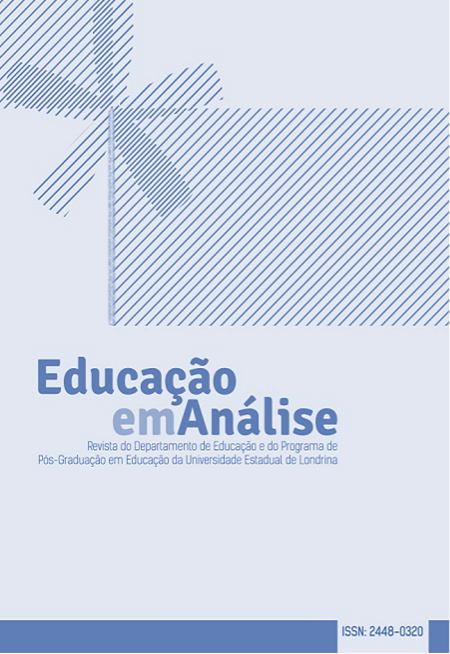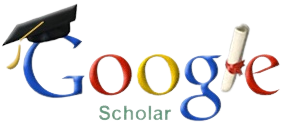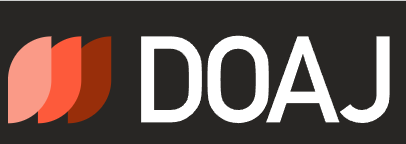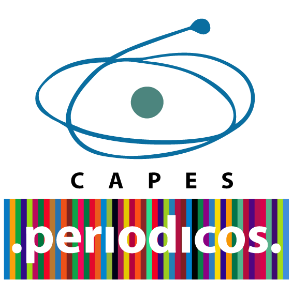Autorregulação da aprendizagem: adaptação e evidências de validade de instrumentos para universitários brasileiros
DOI:
https://doi.org/10.5433/1984-7939.2019v4n1p21Palavras-chave:
Autorregulação. Autoeficácia, Avaliação, Aprendizagem, Ensino superiorResumo
O objetivo desse estudo é apresentar as adaptações transculturais para a realidade brasileira e as evidências de validade de três instrumentos direcionados à compreensão da autorregulação da aprendizagem em estudantes do ensino superior: Inventário de Processos de Autorregulação da Aprendizagem (IPAA), Questionário de Instrumentalidade da Autorregulação da Aprendizagem (QIAR) e Questionário de Autoeficácia para a Autorregulação da Aprendizagem (QAEAR). As etapas envolvidas no presente estudo foram: (1) traduções das escalas de suas versões portuguesas e adaptações de itens ao contexto brasileiro; (2) análise das propriedades psicométricas das três escalas. As evidências de validade foram obtidas através da Análise Fatorial Exploratória realizada com uma amostra de 2006 estudantes, matriculados em instituições públicas e privadas, em cursos de áreas de conhecimento distintas. Os três instrumentos adaptados para o Brasil confirmaram a unidimensionalidade das escalas e a permanência do mesmo número de itens das versões portuguesas. Os coeficientes de consistência interna também se mostraram satisfatórios. Os resultados sugerem que as versões brasileiras do IPAA, do QIAR e do QAEAR produzem medidas válidas e confiáveis para a mensuração dos processos de autorregulação da aprendizagem, da instrumentalidade e das crenças de autoeficácia para a autorregulação da aprendizagem de estudantes brasileiros.Downloads
Referências
BANDURA, A. Social cognitive theory of self-regulation.Organizational behavior and human decision processes, San Diego, v. 50, n. 2, p. 248-287, 1991.
BANDURA, A. Perceived self-efficacy in cognitive development and functioning. Educational Psychologist, Hillsdale, NJ, v.28, n. 2, p.117-148, 1993.
BANDURA, A. Social cognitive theory: an angentic perspective. Annual Rev. Psychology, Palo Alto, v.52, p.1-26, 2001.
BORUCHOVITCH, E. Autorregulação da aprendizagem: contribuições da psicologia educacional para a formação de professores.Revista da Associação Brasileira de Psicologia Escolar e Educacional, São Paulo, v. 18, n.3, p. 401-409, 2014.
BRASIL. Ministério da Educação. Instituto Nacional de Estudos e Pesquisas Educacionais Anísio Teixeira. Censo da educação superior. Brasília, DF: MEC, 2017.
CADÓRIO, L.; VEIGA SIMÃO, A. M. Autorregulação da aprendizagem: um desafio para o desenvolvimento profissional de professores. In: CADÓRIO, L.; VEIGA SIMÃO, A. M. (org.). Mudanças nas concepções e práticas dos professores. Lisboa: Edições Vieira da Silva, 2013.p. 129-148.
CASTRO, M. A. N. Processos de auto-regulação da aprendizagem: impacto de variáveis académicas e sociais. 2007. Dissertação (Mestrado em Psicologia Escolar e da Educação) - Universidade do Minho, [Portugal], 2007.
CEREZO, R. Autorregulacióndelaprendizajeenelámbito universitário¿ por qué por quéahora?. [2011?]. Tese (Doutoramento) -Universityof Oviedo, Espanha,[2011?]. No prelo.
COSTA, M. Procrastinação, auto-regulação e gênero. 2007. Dissertação (Mestrado) - Instituto de Educação e Psicologia, Universidade do Minho, Portugal, 2007.
COULON, A. O ofício de estudante: a entrada na vida universitária. Educação e Pesquisa, São Paulo, v. 43, n. 4, p. 1239-1250, dez. 2017.
EL-KHAWAS, E.Themanydimensionsofstudentdiversity. In: WOODARD, S. R.; KOMIVES, D. B. et al. Student services:a handbook for the profession. 4. ed. San Francisco: Jossey-Bass, 2004. p. 45-62.
EMÍLIO, E. R. V.; POLYDORO, S. A. J. Autorregulação da aprendizagem: fundamentos e implicações no contexto educativo. In: POLYDORO, S. A. J. (org.). Promoção da autorregulação da aprendizagem: contribuições da teoria social cognitiva. Porto Alegre, RS: Editora Letra 1, 2017.v. 3, p. 19-31.
GANDA, D.; BORUCHOVITCH, E. Autorregulação da aprendizagem: principais conceitos e modelos teóricos. Psicologia da Educação, São Paulo, n.46, p. 71-80, 2018.
GRAHAM, S.; HARRIS, K. R.; MACARTHUR, C.; SANTANGELO, T. Self-regulation and writing.In: SCHUNK, D. H.; GREENE, J. A. (ed.). Handbook of self-regulation of learning. 2. ed. New York: Routledge, 2018. p. 138-152.
HAIR JUNIOR, J.F.; BLACK, W.C.; BABIN, B.J.; ANDERSON, R.E.; TATHAM, R.L. Análisemultivariada de dados.6. ed. Porto Alegre: Bookman, 2009.
HUSMAN, J.; DERRYBERRY, W. P.; CROWSON, M.H.; LOMAX, R. Instrumentality, task value, and intrinsic motivation: making sense of their independent interdependence. ContemporaryEducationalPsychology, New York, v. 29, n. 1, p. 63-76, 2004.
ISHII, I.; KRASILCHIK, M.; LEITE, R.C. Diversidade de alunos: o caso da USP. Revista de Educação Pública, Cuiabá, v. 23, n. 54, p. 681-700, 2014.
MADEIRA, L. R. B.; ARAÚJO, M. V.; HEIN, C. F.; MARINHO, H.Adaptationof a self-regulatedpracticebehaviourscale for portuguesemusicstudents. Psychology of Music, Thousand Oaks, CA, v. 46, n. 6, p. 795-812, 2018.
MCCARTHY, J. P.; ANDERSON, L. Active learning techniques versus traditional teaching styles: two experiments from history and political science. Innovative Higher Education, New York, v. 24, p. 279-294, 2000.
NÚÑEZ, J. C.; GONZALEZ, J. A.; CEREZO, R.; ROSÁRIO, P. Implementation of training programs in self-regulated learning strategies in moodle format: results of a experience in higher education. Psicothema,Oviedo, ES, v. 23, n.2, p. 274-281, 2011.
NUNES, T. Programa de promoção de competências de aprendizagem em alunos do 1º ano do ensino superior: um estudo de caso com alunos de insucesso académico. 2009. Dissertação (Mestrado) - Instituto de Educação e Psicologia, Universidade do Minho, Portugal, 2009.
PAJARES, F.; OLAZ, F. Teoria social cognitiva e auto-eficácia: uma visão geral. In: BANDURA, A.; AZZI, R.; POLYDORO, S. A. J. (org.). Teoria social cognitiva: conceitos básicos. Porto Alegre: Artmed, 2008. p. 97-114.
PASQUALI, L. Psicometria. Revista da escola de enfermagem da USP, São Paulo, v. 43, p. 992-999, dez. 2009. Número especial.
PELISSONI, A.M.S. Eficácia de um programa híbrido de promoção da autorregulação da aprendizagem para estudantes do ensino superior. 2016. Tese (Doutorado) - Unicamp, Campinas, São Paulo, 2016.
PELISSONI, A. M. S.; POLYDORO, S. A. J. Programas de promoção da autorregulalção da aprendizagem. In: POLYDORO, S. A. J. (org.). Promoção da autorregulação da aprendizagem: contribuições da teoria social cognitiva. Porto Alegre, RS: Editora Letra 1, 2017.v.3, p. 33-44.
PINA, F.; ROSÁRIO, P.; TEJADA, J.; LARA, E. Promocióndelaprendizaje estratégico y competencias de aprendizajeenestudiantes de primero de universidad: evaluación de una intervención. Revista de InvestigacionEducativa, Salamanca, v.24, n.2, p.615-632, 2006.
PINTRICH, P. R. The role of goal orientation in self-regulated learning.In: BOEKAERTS, M.; PINTRICH, P. R.; ZEIDNER, M. (ed.). Handbook of self-regulation.Cambridge: Academic Press, 2000.p. 452-502.
POLYDORO, S. A. J.; OLIVEIRA, K. L.; MERCURI, E. N. G. S.; SANTOS, A. A. A. Uso de instrumentos de avaliação na produção científica envolvendo universitários brasileiros. Avaliação Psicológica, São Paulo, v. 15, p. 45-55, 2016. Número especial. DOI: 10.15689/ap.2016.15ee.05.
POLYDORO, S. A. J.; AZZI, R. G. Apontamentos preliminares: a autorregulação na teoria social cognitiva. In: POLYDORO,S. A. J. (org.). Promoção a autorregulação da apredizagem: contribuições da teoria social cognitiva. Porto Alegre, RS: Editora Letra 1, 2017.v.1, p. 11-17.
POLYDORO, S. A. J.; PELISSONI, A. M. S.; CARMO, M. C.; EMILIO, E. R. V.; DANTAS, M. A.; ROSÁRIO, P. Promoção da autorregulação da aprendizagem na universidade: percepção do impacto de uma disciplina eletiva. Revista Educação PucCamp, Campinas, v. 20, n. 3, p. 201-213, set./dez. 2015.
ROSÁRIO, P.; MOURAO, R.; NÚÑEZ, J. C.; GONZÁLEZ-PIENDA, J.; SOLANO, P.; VALLE, A.Eficacia de un programa instruccional para lamejora de procesos y estrategias de aprendizajeenlaenseñanza superior. Psicothema, Oviedo, ES, v. 19, n. 3, p. 353-358, 2007.
ROSÁRIO, P. Questionário de auto-eficácia e instrumentalidade da autorregulação da aprendizagem. [Portugal]: Universidade do Minho, 2009. Versão para investigação. Manuscrito.
ROSÁRIO, P.; NUNES, T.; MAGALHÃES, C.; RODRIGUES, A.; PINTO, R.; FERREIRA, P. Processos de auto-regulação da aprendizagem em alunos com insucesso no 1.º ano de Universidade. Revista Semestral da Associação Brasileira de Psicologia Escolar e Educacional, São Paulo, v. 14, n. 2, p. 349-358, jul./dez. 2010.
ROSÁRIO, P.; PAIVA, O.;GONZÁLEZ-PIENDA, J. A.; LOURENÇO, A. A.; NÚÑEZ, J. C.; VALLE, A.Inventário de processos de auto-regulação da aprendizagem (IPAA). In: MACHADO, C.; GONÇALVES, M.; ALMEIDA, L.S.; SIMÕES, M.R. (ed.) Instrumentos e contextos de avaliação psicológica. São Paulo: Almedina, 2011.v. 1, p.159-174.
ROSÁRIO, P.; LOURENÇO, A.; PAIVA, M. O.; NÚÑEZ, J. C.; GONZÁLEZ-PIENDA, J. A.; VALLE, A.Autoeficacia y utilidadpercibida como condiciones necesarias para unaprendizaje académico autorregulado.Anales de Psicologia, Murcia, ES, v.28, n.1, p.37-44, 2012.
ROSARIO, P; POLYDORO, S. A. J. Capitanear o aprender: promoção da autorregulação da aprendizagem no contexto escolar. São Paulo: Casa do Psicólogo, 2014. v. 1.
ROSÁRIO, P.; PEREIRA, A., HÖGEMANN, J., NUNES, A. R., FIGUEIREDO, M., NÚÑEZ, J. C., FUENTES, S., GAETA, M.L.Autorregulacióndelaprendizaje: una revisiónsistemáticaen revistas de la base SciELO*. Univ. Psychol. Bogotá, Colombia, v. 13, n. 2,p. 781-797, abr./jun.2014a.DOI:10.11144/Javeriana.UPSY13-2.aars.
ROSÁRIO, P. et al. Transcultural analysis of the effectiveness of a program to promote self-regulated learning in Mozambique, Chile, Portugal and Spain.HigherEducactionResearch&Development, [London], v.4, p. 1-15, 2014b.
ROSÁRIO, P.; NÚÑEZ, J.;GONZÁLEZ-PIENDA, J.Cartas do Gervásio ao Seu Umbigo:comprometer-se com o estudar na universidade. 2. ed. São Paulo: Almedina-Brasil, 2017.
SALGADO, F. A. F.; POLYDORO, S.; ROSÁRIO, P. Programa de promoção da autorregulação da aprendizagem de ingressantes da educação superior. Psico-USF, BragançaPaulista, v. 23, p. 667-679, 2018.
SCHUNK, D. H.; GREENE, J. A. Historical, contemporary, and future perspectives on self-regulatedlearning and performance.In: SCHUNK, D. H.; GREENE, J. A (ed.). Handbook of self-regulation of learning. 2. ed. New York: Routledge, 2018. p. 1-17.
TINTO, V. Classrooms as communities: exploring the educational character of student persistence. The Journal of Higher Education, [London], v. 68, n. 6, p. 599, nov. 1997.
VARGAS, H.; HERINGER, R. Políticas de permanência no ensino superior público em perspectiva comparada: Argentina, Brasil e Chile. Archivos Analíticos de Políticas Educativas, Estados Unidos, v. 25, n. 72, p. 1-36, 2017. DOI: http://dx.doi.org/10.14507/epaa.25.2799.
WINNE, P. H.; PERRY, N. E.Measuring self-regulated learning. In: BOEKAERTS, M.; PINTRICH, P. R.; ZEIDNER, M. (ed.). Handbook of self-regulation.Cambridge: Academic Press, 2000.p. 531-566.
WOLTERS, C. A.; WON, S. Validity and the use of self-report questionnaires to assess self-regulated learning.In: SCHUNK, D. H.; GREENE , J. A (ed.). Handbook of self-regulation of learning. 2.ed. New York: Routledge, 2018. p. 307-322.
ZIMMERMAN, B. J. A social cognitive view of self-regulated academic learning.Journal of Educational Psychology, Arlington, v.81, n.3, p.329-339, 1989.
ZIMMERMAN, B. Attaining self-regulation: asocial cognitive perspective.In: BOEKAERTS, M.; PINTRICH, P. R.; ZEIDNER, M. (ed.). Handbook of self-regulation.Cambridge: Academic Press, 2000. p. 451-501.
ZIMMERMAN, B. Theories os self-regulated learning and academic achievement: an overview and analysis. In: ZIMMERMAN, B.; SCHUNK, D. Self-regulated learning and academic achievement: theorical, perspectives. 2.ed. Nova Jersey: Lawrence Erlbaum Associates, 2001. p.1-37.
ZIMMERMAN, B. Investigating self-regulation an motivation: historical background, methodological developments, and future prospects. American Educational Research Journal, Washington, v. 45, n. 1, p. 166-183, 2008.
Zimmerman, B. J., & Moylan, A. R. Self-regulation: Where metacognition and motivation intersect. In D. J. Hacker, J. Dunlosky, & A. C. Graesser (Eds.), The educational psychology series. Handbook of metacognition in education. New York, NY, US: Routledge/Taylor & Francis Group, p. 299-315, 2009.
ZIMMERMAN, B. J. Motivational sources and outcomes of self-regulated learning and performance.In: ZIMMERMAN, B. J.; SCHUNK, D. H. (ed.). Handbook of self-regulation of learning and performance. New York: Routledge, 2011. p. 49-64.
Downloads
Publicado
Como Citar
Edição
Seção
Licença
Copyright (c) 2019 Educação em Análise

Este trabalho está licenciado sob uma licença Creative Commons Attribution 4.0 International License.
Os artigos publicados na Revista Educação em Análise estão sob a Licença Creative Commons Atribuição 4.0 Internacional, garantindo Acesso Aberto. Deste modo, os autores mantêm os direitos autorais de seus trabalhos e, em caso de republicação, solicita-se que indiquem a primeira publicação nesta revista. Essa licença permite que qualquer pessoa leia, baixe, copie e compartilhe o conteúdo, desde que a devida citação seja feita. Além disso, autoriza a redistribuição, adaptação e criação de obras derivadas em qualquer formato ou meio, incluindo uso comercial, desde que a atribuição à revista seja mantida.
A revista se reserva o direito de efetuar, nos originais, alterações de ordem normativa, ortográfica e gramatical, com vistas a manter o padrão culto da língua e a credibilidade do veículo. Respeitará, no entanto, o estilo de escrever dos autores. Alterações, correções ou sugestões de ordem conceitual serão encaminhadas aos autores, quando necessário.
As opiniões emitidas pelos autores dos artigos são de sua exclusiva responsabilidade.

























